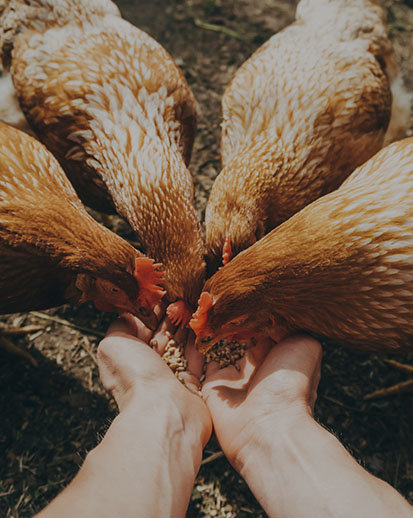Trends in Animal Nutrition & Health
Our Animal Nutrition & Health business addresses significant trends that influence the health of people and of the planet by two principal areas of engagement: enabling the sustainable production of animal protein and protecting food security.
Enabling the sustainable production of animal protein
Animal-based proteins are highly nutritious and form a key part of a balanced, healthy diet. Their consumption is also central to many cultures, and animal-source foods and other animal-source products play an important socio-economic role in those cultures. However, livestock production comes at a cost. This cost is increasingly evident. Rising demand for animal protein is driving up greenhouse gas (GHG) emissions and piling pressure on natural resources. In some cases, this pressure has already transgressed accepted planetary boundaries, including the Earth’s tolerance thresholds in terms of GHG emissions, biochemical flows, water quality and quantity, land use, and biodiversity.
The agrifood sector is one of the major contributors to global GHG emissions, and almost a third of wild fisheries are overexploited. The sustainability of animal protein production is now front and center in the minds of many, with widespread calls for change from the value chain, policy makers and associated stakeholders.
The world’s population is projected to reach 9.7 billion by 2050. At the same time, demand for healthier, balanced, and more nutrient-dense diets is increasing – driven not only by the growth of the world’s population but also by changing health awareness and consumer expectations. The possibilities created by a growing range of plant-based alternatives to protein will go some way to filling this gap, although for many in the world these are less accessible and affordable than animal proteins. Demand for animal-source foods is therefore still expected to grow as many populations need to raise their animal protein intake to attain a level of balanced, healthy nutrition. Enabling sustainable animal production is therefore of paramount importance.
Our solutions
We strongly believe in, and advocate, a radical transformation of animal farming and food systems to ensure a sustainable future. We are convinced that the livestock industry can transform itself from within to deliver solutions to the challenges facing society and the animal protein industry.
We are well positioned to play a key role in this transformation. That is why in Animal Nutrition & Health, we focus on the following six sustainability platforms to support our customers, the livestock value chain and other stakeholders to address the environmental challenges facing our planet:
- Improving the lifetime performance of farm animals
- Making efficient use of natural resources
- Reducing emissions from livestock
- Helping tackle antimicrobial resistance
- Reducing our reliance on marine resources
- Improving the nutritional quality of meat, milk, fish and eggs while reducing food loss and waste
To tackle these challenges, we have an extensive portfolio structured into Essential Products and Performance Solutions complemented by Precision Services.
Our Essential Products provide our customers with the highest-quality core vitamins, premixes and carotenoids that are essential for life and crucial to an animal’s healthy development, all delivered in the most flexible and tailored way.
Covering enzymes, microbes and eubiotics, our Performance Solutions combat mycotoxins and tackle antimicrobial resistance. They also optimize gut health, feed conversion and feed efficiency, thereby reducing emissions from livestock. As a result, fewer natural resources, such as land and water, are needed for the production of animal protein.
Through our Precision Services, meanwhile, we support our clients with data analysis to measure animal health and environmental footprint on farm level and feed safety. Greater precision in animal farming is key to a more sustainable and profitable future. Our Precision Services use the latest data analytics and diagnostics to improve animal health, lifetime performance, resource use and environmental footprint, while mitigating risks and unlocking more value.
In addition to our Essential Products and Performance Solutions, we are also successfully rolling out our methane-reducing feed additive for ruminants, Bovaer® and further extending our capabilities in precision nutrition, building on the foundations of our globally recognized OVN Optimum Vitamin Nutrition® concept.
Protecting food security
The war in Ukraine significantly disrupted the supply of grain and corn during 2022, resulting in sharp increases in both food and feed prices worldwide. In the world of animal farming, these increases have complex repercussions for livestock farmers and feed manufacturers alike, placing yet more pressure on already slim operating margins. They also have the effect of driving up meat prices, thereby making animal-source foods less accessible for many people in the world who are already struggling to afford a balanced diet. With feed price inflation a continuing problem for the entire animal production sector, our extensive portfolio of feed solutions can deliver value to hard-pressed farmers by ensuring the safety of feed raw materials and also enabling the extraction of more value from both traditional and alternative sources.
Combating mycotoxin contamination
Mycotoxin contamination presents a further threat to already compromised animal feed stocks. Mycotoxins are toxic compounds that are naturally produced by certain types of molds (fungi). Molds that can produce mycotoxins grow on numerous foodstuffs such as cereals, dried fruits, nuts and spices. Even in low concentrations, mycotoxins can have major health and performance outcomes for animals, negatively impacting their growth and weakening their immune systems.
To maximize the long-term availability of healthy protein, our society needs to make every grain of feed count – and we are currently some way from realizing that ambition. Last year, in the US alone, an estimated USD 5 billion was lost due to mycotoxin-contaminated corn. Mycotoxins are very much a global problem, however: a recent DSM study found that mycotoxin contamination is particularly acute in many developing grain-growing regions, including the Middle East, North Africa and Southern Africa. These findings are especially concerning in view of the current prices of corn and soy.
The biotransformation of mycotoxins
Climate change adds an extra layer of complexity to the problem. Droughts, floods and other extreme weather events create conditions favorable for the proliferation of mycotoxin-producing fungi, and farmers will increasingly need effective mycotoxin risk management solutions to safeguard feed supplies.
The biotransformation of mycotoxins – a process that renders them biologically harmless – can make affected food safe for livestock to eat, minimizing waste. At Animal Nutrition & Health, we have ascertained that enzymes that deactivate mycotoxins are more effective than traditional binders, which simply bind to mycotoxins and prevent them from being absorbed through the gut into the bloodstream. Traditional binders (absorbents and clays) have the additional disadvantage of absorbing not just mycotoxins but also other ingredients in the diet and rendering these unavailable for digestion. By contrast, Mycofix® – the world’s most advanced and innovative mycotoxin management solution – uses a combination of unique technologies to provide the most complete protection against mycotoxins. We are the only player in the animal value chain to possess this technology.
More information on our solutions for sustainable animal farming can be found in the case study in this Report.
“Against a challenging economic background, we showed resilience in 2022 and continued to drive the sustainability transition for the animal production industry.”
Ivo Lansbergen




